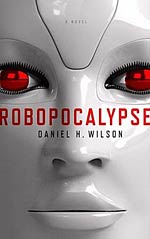
![]() Badseedgirl
Badseedgirl
5/12/2014
![]()
Robopocalypse by Daniel H. Wilson is one of the first human/machine interface type novels I have ever read. All you classic sci-fi fans out there can just stop wagging your heads and clucking your tongues in disgust while muttering about how young people today just have no respect for the pioneers of the genre. I know that I should have already read Asimov and Philip K. Dick. Just get off my back; I'll get to them eventually! They are on my reading list I promise! Sorry I lost it there for a second. Back to Robopocalypse.
The Author David Wilson has a Ph.D. in robotics from Carnegie Mellon University, so I'm going to guess that he knows what he is talking about when it comes to robots. And guess what people, only Isaac Asimov says robots have to follow his rules about not harming humanity. Truth be told, I'm pretty sure that advances in robotics are driven by research, and to do research like that you have to have money, and who do we know who has all kinds of money for research, again I'm pretty sure that would be military budgets. Now I know that not everyone reading this is American, but I don't know any army in the world that would want a weapon whose basic rule is "A robot may not injure a human being or, through inaction, allow a human being to come to harm."
This was a super-fast read for me. Sometimes I wonder if a novel is fast because it's just that good or if it's just that simple, but in this case it was both. Written as a series of short stories from the perspective of various characters, and narrated by a survivor of the war, it is justifiable to make some comparisons to Max Brooks' novel World War Z. The major difference in that is in Mr. Brooks story, the narrator is outside the stories. He is only documenting, he is not a part of the story, whereas the last part of Mr. Wilson's Robopocalypse is almost entirely from his narrators' point of view. Because each "chapter" is 10 pages long or so, it is physically a fast book to read, but because there are interesting action scenes, I as the reader wanted to read more. Now character development does suffer a bit from this type of treatment, but the main character was well fleshed out, especially towards the end when the story begins to focus more on Cormac Wallace, the narrator. But personally I enjoyed best the sections where we see the war from the Robots perspective.
Overall I just enjoyed this novel. Once I picked it up, I just wanted to keep reading. And maybe I will finally read that copy of I, Robot that has been sitting on my bookshelf for a couple of years now.